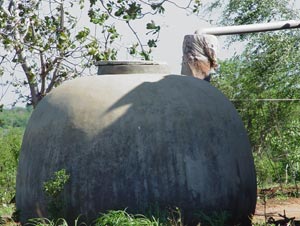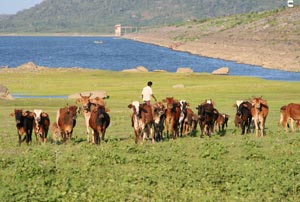The impending global water crisis can be averted if nations holistically rethink how they use their water resources. This is the main message of the book Out of Water: From abundance to scarcity and how to solve the world’s water problems, published by FT Press.
Authors Colin Chartres and Samyuktha Varma lay out a six-point plan for improving how governments manage their water resources. “If leaders execute our vision they will relieve the immense pressures placed on dwindling water supplies by the world’s rising population, expanding cities, pollution, emerging biofuel crops and climate change,” explains Chartres, Director General of the International Water Management Institute (IWMI) in Colombo. “This action is vital to ensure that the world does not go hungry in the coming decades.”
 |
| Rain water harvesting tank |
Chartres and Varma take readers on a journey from days when the Earth’s water resources were considered infinite to the gravely illuminating years of the 1980s when over-exploitation of resources led to severe degradation of locations such as the USA’s Colorado River and Australia’s Murray-Darling Basin.
Today, a third of people face water scarcity. To avoid a rash of similar disasters, culminating in world-wide water shortages, the authors recommend that planners take the following actions: 1) gather high-quality data about water resources; 2) take better care of the environment; 3) reform how water resources are governed; 4) revitalize how water is used for farming; 5) better manage urban and municipal demands for water; and 6) involve marginalized people in water management.
Data is vital for effective water use because “if you can’t measure it, you can’t manage it”. One of the reasons many countries manage their water resources badly is because they have no high-quality data on rainfall patterns, river flow volumes and flood risks. In future, as climate change increases the variability of rainfall, it will be crucial that planners have information to help them accurately forecast changes to water resources.
Recently, IWMI and Sri Lankan partners initiated the development of a prototype system that can help manage national water resources data and information. This information includes data on rainfall, run-off, per capita water availability, characteristics of floods and other disasters, governance and more. The prototype is just an illustration of what can be achieved. The development of a comprehensive national water audit for Sri Lanka could be an example for other developing countries to follow.
Future agriculture must be conducted in harmony with natural ecosystems, as these provide valuable services such as decontaminating water, protecting communities from floods and nurturing nutritious fish. Data will also be crucial to calculating how much water a river ecosystem requires to remain healthy, and what proportion of water can be safely allocated to agriculture.
How water is governed needs to be overhauled, as many existing institutional and governance models were designed to meet the needs of large-scale, colonial, monoculture farming.
 |
| The Lunugamvehera resevoir |
The surface irrigation infrastructure used to supply water to these crops no longer meets the needs of today’s farmers, many of whom operate at a smaller scale and grow a variety of fruit and vegetables.
As surface irrigation schemes have slowly stagnated, millions of farmers have taken water supply into their own hands by pumping up groundwater, often with catastrophic consequences for the environment. “New models of water governance are needed that clearly define water rights, operate fair pricing policies and empower farmers in water management, while ensuring they use water sustainably,” urges Varma.
Revitalizing agriculture requires the physical infrastructure created under the old governance models to be overhauled and updated. For example, instead of trying to use the surface irrigation schemes of Asia to deliver water to farmers individually, it may be more effective to recharge the groundwater from which they are presently pumping out water.
There are also opportunities for developing a range of new irrigation and water storage technologies in Africa. Competition for water between agriculture, industry and cities, meanwhile, must be carefully managed. To help conserve supplies, farmers need to increase the ‘crop per drop’, while industry and cities must find new ways to reuse and recycle water. Sydney is setting a good example in this regard; it has cut water use by introducing ‘water wise rules’ and aims for 12 per cent of its water needs to come from recycling by 2012.
Poor, marginalized communities often bear the brunt of extreme events such as floods and droughts. The final action requires authorities to give impoverished societies access to small water stores and soil improving technologies that will help them contain floodwaters and nurture crops through dry spells, as climate change accelerates.
They should also take action to involve women in decisions about water use; many women now run farms but are excluded from decision-making because of community attitudes and the failure of policy-makers to incorporate equal rights and access.
“These six actions offer our best chance to avert the impending global water crisis and ensure there is enough water to grow food for all, develop industries and support expanding cities,” says Varma. |




